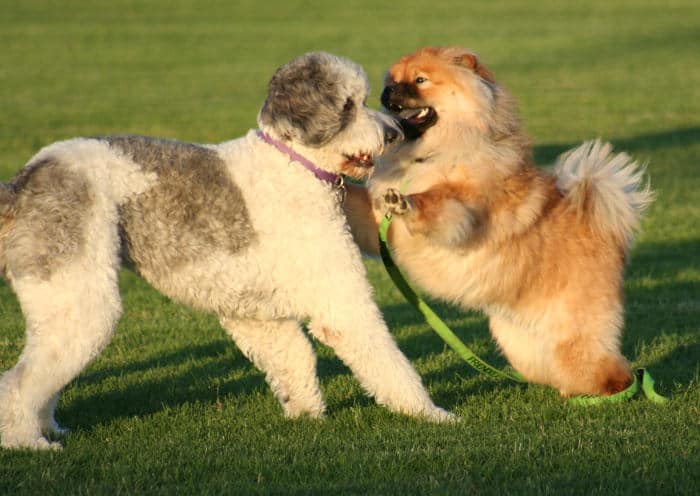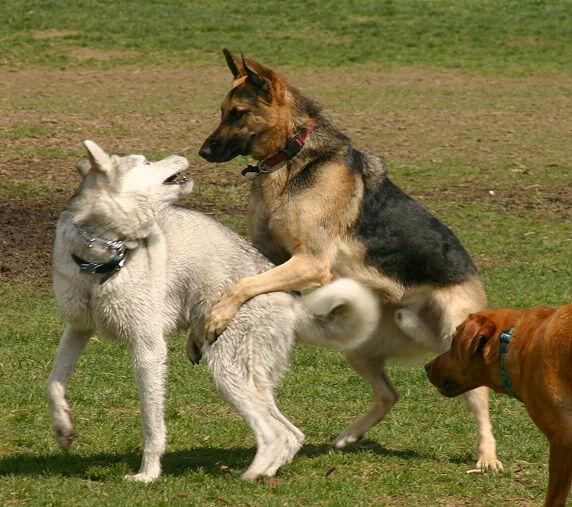For nearly anything and everything that a dog may do, you can find some article giving you a single, exact and precise explanation. One where they fully ignore that neither dogs nor people will always do the same thing for the exact same reason. For a discussion I’ve picked an author who often tends to do that.
No, When Male Dogs Mount Other Males, It Doesn’t Mean They’re Gay by Stanley Coren, PhD, DSc, FRSC, where he starts with:
- A recent news report indicated that a family gave up a dog because they felt it demonstrated homosexuality by “mounting” another male dog.
- Mounting behavior is used by one dog to express power and dominance over another dog, regardless of sex.
- Neutering is not an effective control for mounting behavior.
And the reasons he gave were:
It is not the case that everything we see is about sex and gender roles. When it comes to what appears to be sexual behavior, it is clear that too much anthropomorphism combined with limited knowledge of dog behavior can lead to bad outcomes for family pets.
Stanley Coren
While all this is often very true, anthropomorphism can be found in many other places. For an example, let’s just apply Dr. Coren’s own argument to his own statement, and reword it as this:
Here it is not the case that everything we see is about power and dominance!
And as there is nothing he presents other than his own interpretation of dog behavior to support his dominance claim, perhaps he’s also a bit anthropomorphic here?

What We Already Know
Alternately, we already know that many behaviors related to both predation and sexual congress are expressed during play. We know that two puppies stalking, chasing, and jumping on each other do not intend to tear apart and eat the other one. That they often find these behaviors to be enjoyable practice, with no intention to do serious harm.
And mounting is also a similar type of puppy play, with all of these changing in style as they grow up. Over time, the very wild puppy jumping turns into a more structured adult play style, and some behaviors are no longer desired or tolerated. Sure, there will be a few dogs who will have continued the mounting behaviors, but the majority of those who do this often are still socially naive. They have just never had the opportunity to learn adult play skills, and to experiment and decide which adult play styles they personally enjoy.
Unlike people, dogs do not discuss politics or form complex hierarchies (which often rely on dominance). And much of this dominance discussion about dogs is poorly defined, misdirected, and often quite ludicrous, as you can read about in Dr. Overall’s classic articles, or my summary.
Dumbed down by dominance, February 29, 2012Karen L. Overall, MA, VMD, PhD, DACVB, CAAB, Exploring our misconceptions and myths about human-pet relationships.
Dumbed down by dominance, Part 2: Change your dominant thinking
The Teaching Dog

One of my dogs enjoyed teaching young pups and, after his training on working with dogs, he taught and managed dozens of fosters and others. With some of these I observed some interesting behaviors related to mounting.
Once my dog felt the pup was old enough and ready, he would attempt to mount them. If the pup was already familiar with the behavior and calmly stopped him, he would just walk away and not try again. But if the pup seemed anxious and didn’t know what was happening or how to respond, he would continue repeating this occasionally. Within a few weeks every pup learned how to calmly and effectively respond in a manner that suited them. The only ones he continued to mount were those few who seemed to just ignore it as a part of play they didn’t mind, but who also knew how to just roll or walk out of it whenever they wanted.

Later on, most of those dog were taken to a local dog park to meet a variety of other dogs. Occasionally, some dog there would try mounting them, and they’d immediately know how to calmly respond.
As for dominance, for years my dog worked with the highly fearful or aggressive dogs, teaching them social skills and confidence. Surely not something you would expect from a so-called dominant dog. Yet dominance seems to be about the only way Dr. Coren has to describe a socially adept dog.
In years at dog parks and shelter play groups, nearly every time I see a dog repeatedly try to mount other dogs, further watching clearly shows it due to his lack of social skills. That while he’s well past puppy-hood, his play attempts are limited to what you commonly see in young pups, with mounting, throwing paws over another dog’s back, and similar play.
In summary
We know that very few behaviors have only a single intent or purpose. We know that many behaviors first developed for a particular purpose also occur in other contexts, often in play because we come to find them enjoyable. That while many of these may be early practice for later predation or sexual congress, many pets just enjoy eating out of a can instead of tearing apart prey.
To somehow try and directly associate some ill-defined dominance theory with a common aspect of puppy play is just silly.
